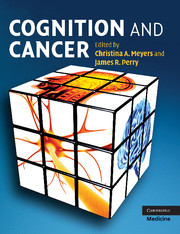Book contents
- Frontmatter
- Contents
- List of contributors
- Preface
- Section 1 Cognition and the brain: measurement, tools, and interpretation
- Section 2 Effects of cancer and cancer treatment on cognition
- Section 3 Interventions and implications for clinical trials
- 20 Behavioral strategies and rehabilitation
- 21 Support services
- 22 Pharmacological interventions for the treatment of radiation-induced brain injury
- 23 Neurocognitive testing in clinical trials
- Index
- Plate section
- References
23 - Neurocognitive testing in clinical trials
Published online by Cambridge University Press: 13 August 2009
- Frontmatter
- Contents
- List of contributors
- Preface
- Section 1 Cognition and the brain: measurement, tools, and interpretation
- Section 2 Effects of cancer and cancer treatment on cognition
- Section 3 Interventions and implications for clinical trials
- 20 Behavioral strategies and rehabilitation
- 21 Support services
- 22 Pharmacological interventions for the treatment of radiation-induced brain injury
- 23 Neurocognitive testing in clinical trials
- Index
- Plate section
- References
Summary
Importance of Formal Neurocognitive Testing
Since the early 1990s it has been recognized that the “net clinical benefit” of a therapy includes not only traditional survival endpoints but also benefits in terms of symptoms and quality-of-life endpoints (O'Shaughnessy et al., 1991). With increasing awareness that it is often inadequate to measure survival without consideration of the “quality” of that survival, there has been a call to develop and include neurocognitive and patient-reported outcome (PRO) measures into modern trial design. Members of the Food and Drug Administration (FDA), National Cancer Institute (NCI), American Association for Cancer Research (AACR), and American Society of Clinical Oncology (ASCO) met in 2006 to discuss endpoints for drug registration trials in primary brain cancer. The recommendations generated from this meeting were provided for the Oncology Drug Advisory Committee's (ODAC) consideration and included a composite progression endpoint in which radiographical, neurocognitive, neurological, and PRO are jointly considered (http://www.fda.gov/cder/drug/cancer_endpoints/brain_summary.pdf; accessed 10 April, 2008). The FDA has recently opined that a therapeutic agent may be approvable if preservation of neurocognitive function can be demonstrated even if survival endpoints are equivalent (minutes of an end-of-phase-II meeting regarding a novel radiation sensitizing agent, October 21, 1998).
Impaired neurocognitive functioning occurs in the majority of patients with central nervous system (CNS) tumors and has been shown to be impaired by cancer therapies for tumors arising outside the brain (Meyers et al., 1995; Wefel et al., 2004b).
- Type
- Chapter
- Information
- Cognition and Cancer , pp. 320 - 328Publisher: Cambridge University PressPrint publication year: 2008



